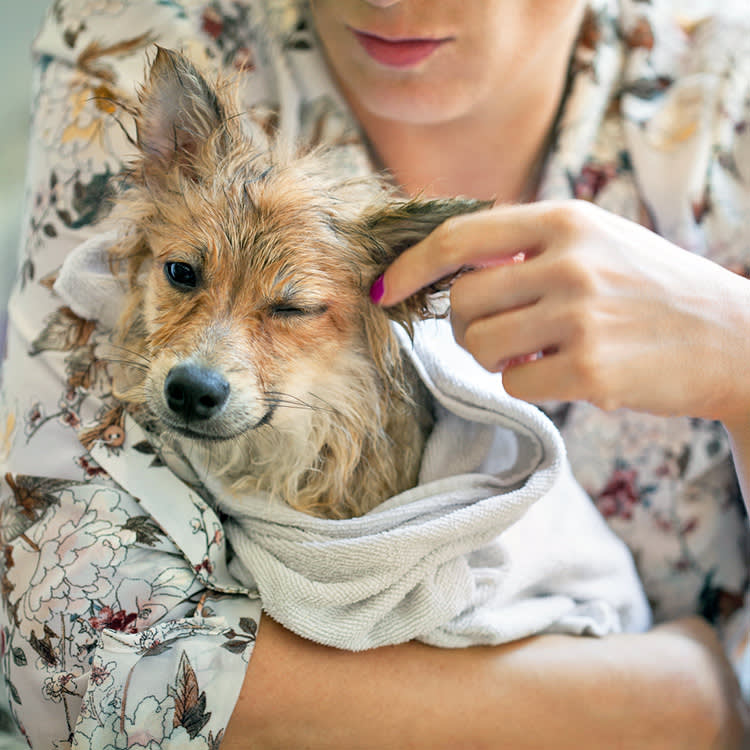Dog Has Ear Infection, and You Can’t Afford the Vet? Options and Remedies
A breakdown of ear infections, treatments, and what to do if your dog is suffering and your finances are tight.

Share Article
In This Article:
What Are Dog Ear Infections Home Remedies for Dog Ear Infections Low-Cost Services and Other Financial Options When to Seek Professional Help
Ear infections are extremely common among dogs. They can occur alongside allergies, water in the ears, ear mites, foreign objects in the ears, or systemic illnesses such as hypothyroidism. Some dogs develop chronic infections that occur frequently and are difficult to treat. Others just get the occasional infection, which is easily treated.
Ear infections in dogs can be annoying and painful. What if finances are tight and you can’t afford the vet? This article will cover the symptoms and causes of ear infections in dogs and provide some less expensive remedies.

What are dog ear infections?
When a dog has an ear infection, it can be in one ear or both. Bacteria, yeast, or other irritants can cause it. If it is not treated, it can become quite serious and even lead to ruptured eardrums and hearing loss. Some mild ear infections can be treated with home remedies, while others require veterinary treatment.
Common types of ear infections
There are three main types of ear infections in dogs, correlating to the three chambers of the ears.
Otitis externa: This is the most common type, affecting the outer ear canal.
Otitis media: An infection of the middle ear. This often results from an untreated outer ear.
Otitis interna: This inner ear infection is a serious condition. It can cause loss of balance and hearing.
Main causes of ear infections
Ear infections are typically caused by the following.
Moisture: Many dogs love to swim, but getting water in their ears is a common cause of ear infections.
Allergies: Food or environmental allergies can trigger inflammation, which can lead to secondary infections.
Ear mites: These annoying, itchy parasites are most commonly found in puppies, stray dogs, and cats.
Foreign objects: Irritants to the ear, such as grass seeds, dirt, or excessive ear hair, can cause irritation.
Underlying illnesses: Conditions such as hypothyroidism or diabetes can predispose dogs to chronic ear issues.
Typical symptoms of dog ear infections
Watch for these signs:
Head shaking
Constant ear scratching or rubbing their ears on furniture
Redness and swelling inside their ear
Discharge from the ears (yellow, brown, or bloody)
Crusting or scabs in the ears
Pain when touched near their ears
If your dog exhibits these symptoms and you’re unable to visit the vet immediately, there are steps you can take to provide relief at home.
Home remedies to try for dog ear infections
Before you put anything in your dog’s ears, be sure the eardrum isn’t ruptured and the infection isn’t severe. (It’s impossible to determine this with 100 percent certainty without a veterinary examination.) If the ear canal is swollen shut, bleeding, or producing pus, it’s best to skip home treatments and seek veterinary care.
If the issue looks mild and you want to clean your dog’s ears, here are some tips:
Never use Q-tips. Always use cotton balls or gauze.
Clean only the part of the ear that you can see.
If your dog appears in pain or the ear has a strong odor or pus, stop and consult a veterinarian.
For mild cases, you can also try some of these home treatments.
Apple cider vinegar (diluted): Mix equal parts apple cider vinegar and distilled water. Clean the outer ear with a cotton ball saturated with this liquid — do not pour the solution directly into the ear. Vinegar can help restore the normal pH level and fight yeast or bacteria.
Coconut oil: Warm, organic coconut oil just slightly, and place a few drops into the ear. It fights bacteria and fungus.
Green tea rinse: Brew a bag of green tea, and after it cools, gently flush the ear. It calms inflammation and fights bacteria. This can provide temporary relief.
Witch hazel: Used sparingly, witch hazel can dry out excess moisture and soothe inflammation.
Calendula or chamomile: Inflammation can be soothed with natural herbal rinses made from these flowers. They will calm the skin.
Note: Avoid hydrogen peroxide, rubbing alcohol, or essential oils inside the ear canal. These can worsen the irritation or even damage the ear.
Low-cost veterinary services and other financial options
If your dog has an ear infection and you can’t afford the vet, you may be able to find some affordable options. It’s difficult to find completely no-cost options, but there are low-cost or sliding-scale services available. Here are some ways to find help.
Local animal shelters or humane societies often offer low-cost or sliding-scale options.
Veterinary schools and teaching hospitals may offer discounted care because students are performing the procedures, but rest assured that they are under the supervision of licensed veterinarians.
Nonprofit organizations, such as the Pet Fund, RedRover Relief, or the Brown Dog Foundation, help pet parents cover emergency medical care.
CareCredit is a healthcare credit card that offers no-interest or low-interest payment plans for veterinary services. They will check your credit score to determine if you are eligible for approval.
Some vet practices are willing to work out payment-plan options. It’s certainly worth asking.
Although it won’t help at the moment, having pet insurance is beneficial for future incidents.
When you need to seek professional help
There are times when the only answer to your pet feeling unwell is to see a vet. Delaying care in some cases can lead to serious complications, including more severe infections, which can result in hearing loss.
Seek immediate professional help if they’re experiencing any of the following issues.
Your dog is showing signs of extreme pain or neurological symptoms (such as loss of balance, head tilt, walking in circles).
You see a thick, bloody, or green discharge.
The ear canal looks swollen shut or is severely inflamed.
You suspect a foreign body could be lodged in the ear.
Your dog may have a recurrent infection, which could indicate that allergies or endocrine disease are underlying causes.
A veterinarian may prescribe antibiotic or antifungal ear drops or oral medications. They may also conduct tests such as ear cytology or cultures to identify the organism, allergy testing, or treatment plans. If left untreated, ear infections can become chronic and significantly reduce your dog’s quality of life.
Bottom line
Dogs frequently get ear infections. Sometimes, these infections are mild and may respond to home remedies. However, some ear infections can be quite serious and need the care of a veterinarian.
If finances are a concern, several low-cost options are available, including animal shelters, veterinary teaching hospitals, non-profit organizations, CareCredit, and veterinary payment plans.
Monitoring your dog’s behavior, gently cleaning the ears, and using mild, safe remedies may provide short-term relief.
Persistent symptoms, pain, or discharge require a vet’s attention.
FAQs
How much is a visit to the vet for a dog ear infection?
The cost varies widely depending on location and severity. A routine exam and ear cytology will probably add up to $50 to $150. Prescription ear drops should cost $20 to $60. Oral medications (if needed) can set you back $30 to $100. And follow-up appointments may run $30 to $80 each.
Severe cases requiring sedation, culture testing, or deep ear cleaning can cost $200 to $ 500 (or even more). If you’re concerned about cost, ask your veterinarian for a detailed breakdown and inquire about the possibility of starting a partial treatment while waiting for full funding.
Can you successfully treat an ear infection without a vet?
In some mild cases, yes, you can treat an ear infection at home, especially if the infection is early, external (otitis externa), and due to moisture or mild yeast overgrowth. In these cases, cleaning and soothing agents may resolve the issue.
However, without proper diagnostics, it’s difficult to determine the cause of the problem. Treating with the wrong solution (such as using antifungals for a bacterial infection or ignoring a ruptured eardrum) can exacerbate the condition. If symptoms don’t improve in a few days or get worse, seek veterinary care, even if through a low-cost clinic or charity.
References
Fraser, G. “Aetiology of Otitis Externa in the Dog.” Journal of Small Animal Practice, vol. 6, no. 6, Dec. 1965, pp. 445–451, doi.org/10.1111/j.1748-5827.1965.tb04362.xopens in new tab.
Noxon, James O. “Otitis in the Allergic Dog.” Veterinary Allergy, 25 Oct. 2013, pp. 175–182, doi.org/10.1002/9781118738818.ch27opens in new tab.
Tang, Shuiquan, et al. “The Canine Skin and Ear Microbiome: A Comprehensive Survey of Pathogens Implicated in Canine Skin and Ear Infections Using a Novel Next-Generation-Sequencing-Based Assay.” Veterinary Microbiology, vol. 247, Aug. 2020, p. 108764, doi.org/10.1016/j.vetmic.2020.108764opens in new tab.

Dr. Shelby Neely, DVM
Dr. Shelby Neely is a freelance writer and veterinarian who graduated from the University of Pennsylvania School of Veterinary Medicine and has practiced veterinary medicine for 30 years, specializing in small animals. Her work has appeared in Allivet, AsktheCatDoctor, WhiskerDocs, Ask the Cat Doctor Radio, Ask the Cat Doctor TV, and numerous other websites, brochures, newsletters, newspapers, and ebooks. In her spare time, Dr. Neely likes to spend time with her three children, two grandchildren, three cats, two grand-cats, and five grand-dogs.
Related articles
![Dog laying his head on owners lap while owner holds his ears.]()
DIY Physical Exam Part 2 — How to Check Your Dog for Infections
Veterinarian Dr. Shea Cox on how to assess your dog’s eyes, ears, nose, and mouth.
![Puppy with one ear up an done ear down.]()
15 Amazing Facts About Dog Ears
There’s a lot more to your pup’s furry appendages than you might think.
![Basset hound dog in hands of owner sitting outdoor playing with his large ears holding spread in hand]()
A Pain in the Ear: What to Know About Dog Ear Infections
Dogs are especially at risk for ear infections. Here’s what to look out for.
Why Do Your Dog’s Ears Smell?
Recognizing the signs of ear problems early can help to identify issues before they get out of control.
![3 Screenshots side by side of cover photos for three different Veterinarians who post videos on Tik Tok.]()
12 Veterinarians You Should Follow on TikTok
TikTok has an ton of veterinarians giving expert (and entertaining) advice at no cost.







